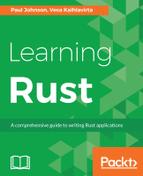We have already seen in this chapter how enums can be somewhat tricky to handle. Thankfully, we can use match on an enum:
enum MyFirstEnum
{
TupleType(f32, i8, String),
StructType {varone: i32, vartwo: f64},
NewTypeTuple(i32),
SomeVarName
}
fn tuple_type(v: f32, c: i8, st: String) {//code}
fn struct_type(v1: i32, v2: f64) {//code}
fn new_type_tuple(n: i32) {//code}
fn process_varname() {//code}
fn match_enum_code(e: MyFirstEnum)
{
match e {
MyFirstEnum::SomeVarName => process_varname(),
MyFirstEnum::TupleType(f,i,s) => tuple_type(f,i,s),
MyFirstEnum::StructType(v1,v2) => struct_type(v1,v2),
MyFirstEnum::NewTypeTuple(i) => new_type_tuple(i)
};
}
You will notice that in this example, _ is not included. That's because we explicitly match against all the possible choices of the enum, so we don't need a catch-all case. If, for instance, we missed NewTypeTuple, the code would need to include a catch-all:
fn match_enum_code(e:MyFirstEnum)
{
match e {
MyFirstEnum::SomeVarName => process_varname(),
MyFirstEnum::TupleType(f,i,s) => tuple_type(f,i,s),
MyFirstEnum::StructType(v1,v2) => struct_type(v1,v2),
_ => return // breaks out of the match
};
}
